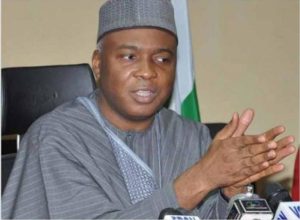
The Senate President, Dr Bukola Saraki, says that the National Assembly has listed 11 economic reform bills to be passed alongside the 2017 Budget to revamp the economy.
Saraki, who is also the Chairman of the National Assembly, made this known before the Presentation of the 2017 Budget by President Muhammadu Buhari before the Joint Session of the National Assembly on Wednesday.
He said the core elements of the bills would aid the executive in mobilising required private capital for the development of the economy.
Saraki, however, called for the mainstreaming of the private sector in order to boost development and get the country out of recession.
He said, “It is, therefore, critical that we mainstream private sector business and investment in the economy.
“To achieve this, we must make it much easier and efficient for people to invest in new business in our country.
“We are aware that we must attract private investment to play a central role in our recovery.
“We must make deliberate effort to market in Nigeria as an attractive brand through a very robust and highly coordinated process of engagements.
“We must start to inject confidence in the market through clarity and consistent policies and speak the same language to ensure that we are open and ready for business.”
He also called for synergy between the executive and legislature, particularly at a time when Nigerians looked to the Federal Government for solution to the problems.
He said, “Accepting the fact that stakeholders would not work magic, all hands must be on deck to assure Nigerians that government is mindful of their plight.
“They don’t want to know what political parties we belong, or the language we speak or the God we worship. They have entrusted their fate in our hands and they need us now more than ever.
“Nigerians will pardon us if we do something wrong, but they will not forgive us if we do nothing at all.
“That is why the two chambers have taken a position, that though there might be differences, our opinions on issues of the economy should be based on one common purpose for this reason.”
On the 2017 budget, the president of the senate said that there were indications that progress had been made compared to the 2016 budget.
He noted that besides the fact that the presentation of the proposal was coming much earlier than last year, progress had been made, particularly by the legislature.
This he said became necessary to avoid the controversies that surrounded 2016 budget.
He said, “Already, this year’s budget process is benefiting from greater cooperation and consultations between the National Assembly and the Executives.
“NASS recognises that the problem with our budget and budget processes goes far deeper than the relative progress we have made.
“In August this year, we inaugurated a joint Executive and Legislative Committee and a Technical committee to review our budget system and identify ways we can make them more transparent, more participatory.”
He said that the committees had submitted their reports adding the National Assembly was in the process of implementing the recommendations.
He said, “These recommendations include, pre-budget consultation and engagement, greater information sharing and recording, public hearing and drafting of an organic public law and amendment of the Public Procurement Act.”
He assured that the National Assembly would continue to seek opportunities to deepen the relationship between the legislature and the executive.